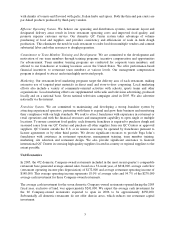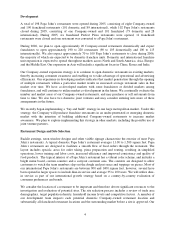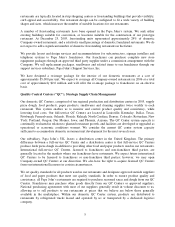Papa Johns 2005 Annual Report Download - page 13
Download and view the complete annual report
Please find page 13 of the 2005 Papa Johns annual report below. You can navigate through the pages in the report by either clicking on the pages listed below, or by using the keyword search tool below to find specific information within the annual report.11
Industry and Competition
The restaurant industry is intensely competitive with respect to price, service, location, food quality and
variety. There are many well-established competitors with substantially greater financial and other
resources than Papa John’s. Competitors include a large number of international, national and regional
restaurant chains, as well as local pizza operators. Some of our competitors have been in existence for a
substantially longer period than us and may have higher restaurant penetration and stronger, more
developed brand awareness in the markets where our restaurants are, or may be located. Based on
independent third-party research, the United States Quick Service Restaurant (“QSR”) Pizza category,
which includes dine-in, carry-out and delivery, had sales of approximately $33.5 billion in 2005, of
which Papa John’s share was reported as 5.2%. Within the pizza segment of the restaurant industry, we
believe our primary competitors are the national pizza chains, including Pizza Hut, Domino’s and Little
Caesars, and several regional chains, including chains executing a “take and bake” concept. A change in
the pricing or other marketing strategies of one or more of our competitors could have an adverse impact
on our sales and earnings. Additionally, a continued increased emphasis on drive thru, carryout and
curbside pickup availability by casual dining restaurants, such as Applebee’s and Outback, as well as
improved quality of fresh and frozen supermarket offerings, could also have an adverse impact on our
sales and earnings.
With respect to the sale of franchises, we compete with many franchisors of restaurants and other
business concepts. In general, there is also active competition for management personnel and attractive
commercial real estate sites suitable for our restaurants.
Government Regulation
We, along with our franchisees, are subject to various federal, state and local laws affecting the operation
of our respective businesses. Each Papa John’s restaurant is subject to licensing and regulation by a
number of governmental authorities, which include health, safety, sanitation, building and fire agencies
in the state or municipality in which the restaurant is located. Difficulties in obtaining, or the failure to
obtain, required licenses or approvals could delay or prevent the opening of a new restaurant in a
particular area. Our full-service QC Centers are licensed and subject to regulation by state and local
health and fire codes, and the operation of our trucks is subject to Department of Transportation
regulations. We are also subject to federal and state environmental regulations.
We are subject to Federal Trade Commission (“FTC”) regulation and various state laws regulating the
offer and sale of franchises. Several state laws also regulate substantive aspects of the franchisor-
franchisee relationship. The FTC requires us to furnish to prospective franchisees a franchise offering
circular containing prescribed information. Substantive state laws that regulate the franchisor-franchisee
relationship presently exist in a substantial number of states, and bills have been introduced in Congress
from time to time, which would provide for federal regulation of the franchisor-franchisee relationship in
certain respects. The state laws often limit, among other things, the duration and scope of non-
competition provisions and the ability of a franchisor to terminate or refuse to renew a franchise. Some
foreign countries also have disclosure requirements and other laws regulating franchising and the
franchisor-franchisee relationship. Further government initiatives, such as “living wage” or other
proposed increases in minimum wage rates, could adversely affect Papa John’s as well as the restaurant
industry. As we expand internationally, we will be subject to applicable laws in each jurisdiction where
franchised units are established.
























